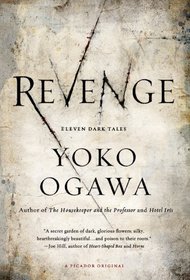This book was very good. With a title like that, I was expecting something heavier or harsher. But these stories, while "dark" in the sense that there's a pervasive sadness underlying all of them, were much quieter and gentler than I anticipated. They were good, though. And I liked how all the stories were sort of related, in that an incident that happens in one story becomes a small mention in another story. Like, two kids find an old post office that's inexplicably filled with kiwi fruit. Then in another story, this woman notices her weird elderly landlady hauling boxes from her backyard (filled with kiwi trees) down to an old abandoned post office down the block in the middle of the night. I like stuff like that.
One thing that stuck out to me as kind of odd is that anytime someone mentions food, it's some Italian or French dish. And this is a Japanese book, so it talks about food kind of a lot. Are minestrone and bouillabaisse popular dishes that Japanese people make at home a lot? That is a legit question, I don't actually know. But I kept wondering if it was a choice on the part of the translator trying to get across the same sense of familiarity and comfort to American readers that Japanese readers would have at a description of a popular Japanese dish.
One thing that stuck out to me as kind of odd is that anytime someone mentions food, it's some Italian or French dish. And this is a Japanese book, so it talks about food kind of a lot. Are minestrone and bouillabaisse popular dishes that Japanese people make at home a lot? That is a legit question, I don't actually know. But I kept wondering if it was a choice on the part of the translator trying to get across the same sense of familiarity and comfort to American readers that Japanese readers would have at a description of a popular Japanese dish.




![header=[] body=[Get a free book credit right now by joining the club and listing 5 books you have and are willing to share with other members!] Help icon](/images/question.gif?v=90afaeb39)
